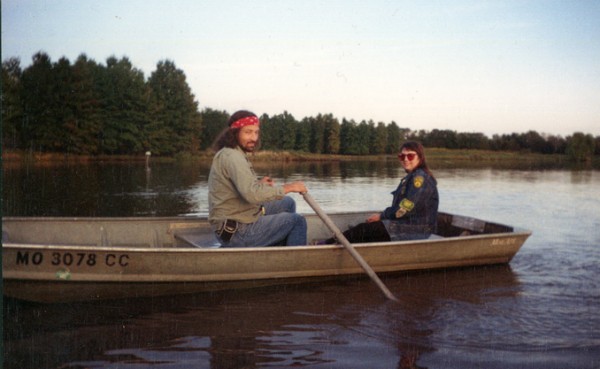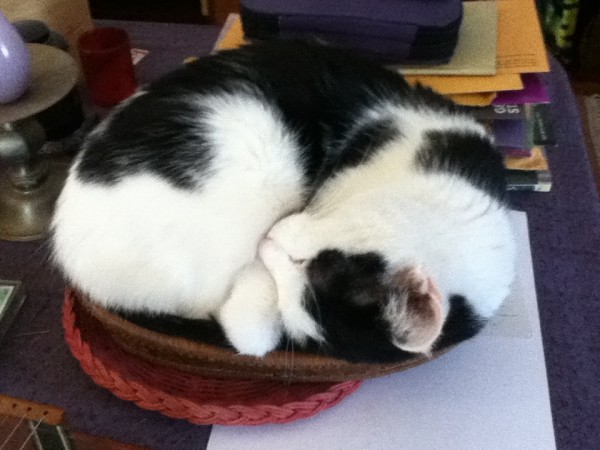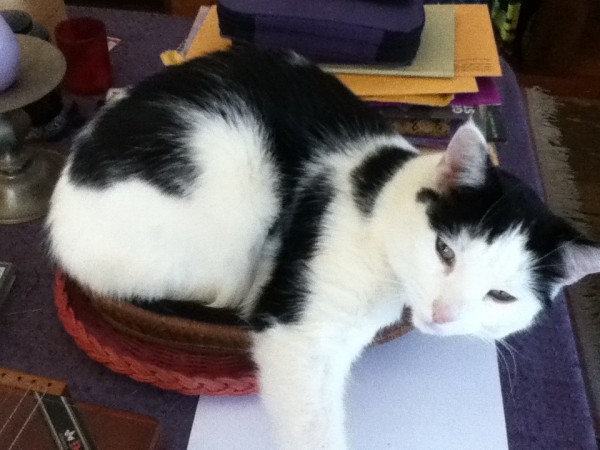A few days ago, I found Gizmo taking a nap in a very odd position, and in a very odd place.
Nixon Memory Lane
This past weekend, we “celebrated” the 40th anniversary of the day Richard Nixon resigned as US president. The iconic image of that event was Nixon smiling and waving the “V-for-victory” sign (some of us knew it as the peace sign) over his head with both hands before ducking into the helicopter to be taken away from Washington for good.
It’s at times like these that I like to read the work of my all-time favorite Nixonologist, who – as Rolling Stone magazine’s representative on the White House press corps – was watching from the Rose Garden as the helicopter flew away.
I felt sorry for him. He hit his head. Right after he did this thing [makes the v-for-victory sign] at the helicopter door, he turned and lashed his head on the top of the rounded door, staggered sideways, and he was so — in some jurisdictions we might have called it “luded out” — he was tranquilized. There’s a civilized word for it: sedated. He was almost led up the stairs. Yeah, I felt sorry for him. Can you imagine that ride west? Jesus Christ, they flew to Andrews Air Force Base, I guess, on the helicopter, and then they had like a six-hour flight to San Clemente. Whew. That must have been a really dark flight.
From interview by Matthew Hahn in The Atlantic
I didn’t watch the resignation speech on TV but I heard it on the radio. I was working that night, making popcorn and pizza and filling sodas at a drive-in theatre near my home town. I brought my radio to work, which was frowned upon but tolerated for this special occasion. I don’t know if I really remember or if I just want to remember that the first song the DJ played after the speech was “Kings”, from Steely Dan’s album Can’t Buy a Thrill. (“We’ve seen the last of good King Richard…”)
So anyway, this weekend I was passed a link to Nixon’s obit, which I found quite entertaining, but I knew there had to be something that was written on the occasion of the resignation. It took some digging to find a full copy of “Fear and Loathing in Limbo: The Scum Also Rises.” That was too much to read, but I did read the introduction, which is mostly a rant of anger and frustration. After having just submitted a 15,000-word piece on Nixon’s resignation, Thompson was informed that “Ford pardoned the bastard.”
Hunter Thompson and Richard Nixon were more than professional adversaries.. the way Thompson tells it, they were mortal enemies. But given a common interest, mortal enemies can become the best of friends, and for Thompson and Nixon that interest was football. Thompson was the only person on the press corps who could talk football, and Nixon knew it; and he would often seek him out when he wanted to talk football instead of politics. Thompson once wrote, “the only thing Nixon was honest about was football.”
The closest I ever came to Nixon was as a hitchhiker in the early 80’s. Running out of energy late one night on a trip from LA to San Diego, I was stuck in San Clemente and rolled out my sleeping bag in the bushes outside the gate to Nixon’s compound, where I slept soundly until the sprinklers woke me up at 5am.
Double Rainbow Over purplearth

When the sun came out during a rain shower, we knew there had to be a rainbow someplace.
This image is a three-frame composite, looking east from our back yard this afternoon.
We didn’t notice the faint outer rainbow until we looked at the pictures.
After a week of rain, this was a good sign going into the weekend.
The Bridge Gallery

A newspaper we read online occasionally puts out a call for photos on a particular theme.
One such “assignment” was for “The World’s Best Bridges”, and it was enough to motivate me to dig thru our bridge pictures. The assignment description said that they weren’t looking for “iconic” bridges (though we have some of them, too), but for those that “make the business of crossing … an experience unlike any other.” I take that to mean “quirky”, and quirky is what we do. Read on
Twenty Years Ago Today
RoZ and I on our first “date”, October 1, 1993…

Obbie and RoZ take a little boat ride on a lake outside Kansas City, MO on October 1, 1993.
While living in Philadelphia, I used some vacation time to visit some friends in Kansas City. I stayed with a couple who took me to an event the night before, which was where I met RoZ for the first time.
On our first full day together, the four of us (five actually, as they had a toddler that came along) took a drive into the country, where we found a couple of boats available for paddling around.
We’re still as happy as we were that day, even though we’ve never been in a rowboat since.
Class Reunions – Who Got Fat, Bald and Divorced
About the time I started high school, my father was planning to attend his twenty-year class reunion, and my mother had two things to say about these affairs. First was that people go to them “to find out who got fat, who got bald, and who got divorced.” A rather cynical outlook, I thought. But as I’ve grown older, it makes more sense, and says a lot in a small number of words.
The other thing was that “everybody just breaks off into the same little cliques that they were in during high school.” That seems natural to me, as we would want to first connect with those we spent the most time with. Regardless, I’ve been told that each reunion gets a bit less cliquey.
At any rate, early this summer I received an invitation to the latest decennial gathering. I can recite a lot of really good reasons that I never go, most having something to do with cost and logistics of getting there and back. But in reality, I have to admit that a class reunion is not something that I get excited about.
Turtle Gallery – Western Wisconsin
We live in an area with a lot of turtle habitat, much of which is criss-crossed by our favorite hiking and biking trails. On top of that, RoZ regards herself as a turtle person.
So we seem to get a lot of turtles jumping in front of our lenses, ranging from the size of a half-dollar to the size of a substantial foot-stool.
See an awesome 9-image gallery of turtles after the jump… Read on
If Data is Collected, It Will Be Mined
Subversives, fugitives and drug dealers have operated under the assumption that all phones are tapped for as long as there have been phones. This is even more the case with today’s digital communication. The safe assumption is that every line is tapped, so when engaging in any form of electronic communication, it’s good to heed the advice given in The Anarchist Cookbook way back in the 1970’s: “If you can’t say it in front of a cop, keep it to yourself.”
So now we learn that the National Security Agency (NSA) has been collecting and analyzing all the data they can grab. This should come as no surprise. If the data is there, they will mine it. They always have, and they always will. I’m not saying that it’s right. It’s actually contrary to every sacred principle this nation was built upon. But it is what it is.
Most of us knew all along that the emperor was walking around naked. Now that the official media has finally noticed, they’re going bat-crap crazy talking about it. Let me throw a few random thoughts into this cacophony. Read on
When is a “Scandal” a Scandal?
When a government acts in a way that some consider scandalous, it’s interesting to compare the reactions of opposing parties.
Ten years ago, the Bush regime engaged in a long litany of violations of civil liberties and international law. Their opponents were alarmed with this blatantly illegal behavior, while their defenders shrugged their shoulders and said, “No big deal.”
So now the IRS has admitted to selectively targeting organizations for scrutiny based on a political agenda, and the Justice Department has admitted to seizing the phone records of AP reporters. As a progressive, I am disturbed by this news.
After all, if these acts had been committed by the Bush/Cheney regime, they would be disturbing (although they would be lost in the long litany of alarming acts). So to have these acts committed by “our side” is no less disturbing.
And that’s the difference between authoritarians and progressives. For the right-whinge conservatives, selective enforcement or spying on reporters was OK when their side did it, but when the other side does it their heads explode. Progressives get upset no matter who does it.
So when you’re arguing with a conservative and he brings up the latest “Obama scandal,” ask him where his outrage was when Bush was conducting selective politically-motivated audits, or spying on every phone call and reading every email in the country.
The Wayback Machine – A How-to
One of our discussion participants recently lamented that when a certain web domain went dark, he lost years worth of blog posts that were hosted on that site. My first thought was to check the Wayback Machine, an online archive of content from the past. With the Wayback Machine, you can see the content and styling of a site as it was at the time it was archived by the Wayback system.
Using the Wayback Machine, I was able to point this guy to four pages of complete posts with images and everything… easily 10,000 words of writing he had thought were lost forever. If you want to check the Internet of the past, the simple instructions are after the jump. Read on





